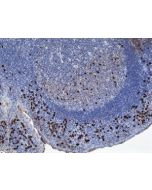Cookie Policy: This site uses cookies to improve your experience. You can find out more about our use of cookies in our Privacy Policy. By continuing to browse this site you agree to our use of cookies.
RevMab
anti-IgA1 (human), Rabbit Monoclonal (RM124) (Biotin)

| Product Details | |
|---|---|
| Synonyms | Immunoglobulin A1 |
| Product Type | Recombinant Antibody |
| Properties | |
| Clone | RM124 |
| Isotype | Rabbit IgG |
| Source/Host | Rabbit |
| Immunogen/Antigen | Human IgA. |
| Label/Conjugates | Biotin |
| Application |
ELISA: 50ng/well-200ng/well (for Capture) 0.05µg/ml-0.2µg/ml (for Detection) Immunocytochemistry (ICC): 0.5µg/ml-2µg/ml Immunohistochemistry (IHC): 0.1µg/ml-1µg/ml |
| Crossreactivity | Human |
| Specificity | This antibody reacts to human IgA1, and very slightly cross reacts with IgA2. No cross reactivity with human IgG, IgM, IgD, or IgE. |
| Purity | Protein A purified. |
| Purity Detail | Protein A affinity purified from an animal origin-free culture supernatant. |
| Concentration | 1 mg/ml |
| Formulation | Liquid. 50% Glycerol/PBS with 1% BSA and 0.09% sodium azide. |
| Other Product Data |
Click here for Original Manufacturer Product Datasheet |
| Accession Number | P01876 |
| Declaration | Manufactured by RevMab Biosciences. |
| Shipping and Handling | |
| Shipping | BLUE ICE |
| Long Term Storage | -20°C |
| Handling Advice | Avoid freeze/thaw cycles. |
| Use/Stability | Stable for at least 1 year after receipt when stored at -20°C. |
| Documents | |
| Product Specification Sheet | |
| Datasheet |
 Download PDF Download PDF |
Immunoglobulin A (IgA) is an antibody isotype that plays a crucial role in the immune function of mucous membranes. IgA has two subclasses (IgA1 and IgA2) and can be produced as a monomeric as well as a dimeric form. The IgA dimeric form is the most prevalent and is also called secretory IgA (sIgA). sIgA is the main immunoglobulin found in mucous secretions, including tears, saliva, sweat, colostrum and secretions from the genitourinary tract, gastrointestinal tract, prostate and respiratory epithelium. It is also found in small amounts in blood. The secretory component of sIgA protects the immunoglobulin from being degraded by proteolytic enzymes; thus, sIgA can survive in the harsh gastrointestinal tract environment and provide protection against microbes that multiply in body secretions. In the blood, IgA interacts with the Fc receptor called FcαRI (or CD89), which is expressed on immune effector cells, to initiate inflammatory reactions. This anti-human secondary antibody has well-characterized specificity for human IgA1 immunoglobulins and is useful in the detection, sorting or purification of its specified target. In general, secondary antibodies offer increased versatility enabling users to use many detection systems (e.g. HRP, AP, fluorescence). They can also provide greater sensitivity through signal amplification as multiple secondary antibodies can bind to a single primary antibody.






